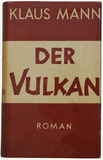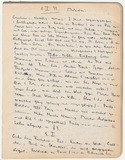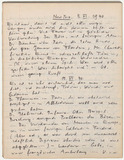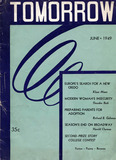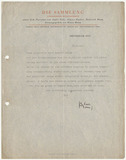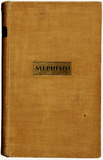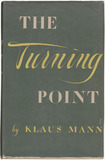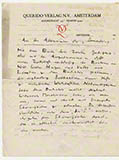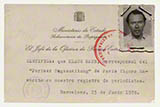Klaus Mann: Der Vulkan. Roman unter Emigranten, first edition (1939)
In his diary, Klaus Mann described his seventh novel, Der Vulkan, published by Querido Verlag Amsterdam in 1939, as his “most important” work. In it he presents a fictionalised examination of the life of emigrant groups in contemporary exile centres such as Paris, Zurich, Prague, Amsterdam and the US.
Klaus Mann: Diary Entries from 1 January 1933 to 8 August 1933
Klaus Mann’s diary notes from the first few months of 1933 are a document of an intensifying political situation in Bavaria. The author began his entries on 1 January 1933, shortly before the end of the Weimar Republic, by commenting on the successful premiere of Die Pfeffermühle (The Peppermill), a political cabaret by his older sister Erika.
Klaus Mann: Diary Entries from 5 June 1940 to 11 December 1942
In September 1938, Klaus Mann left Europe permanently and travelled by ship to New York, where he began his period of exile in America. In the USA the author underwent a linguistic transformation as he increasingly drifted away from his native tongue toward English.
Klaus Mann: Europe’s Search for a New Credo / Die Heimsuchung des europäischen Geistes (1949/1950)
About two months before he took his own life on 20 May 1949, Klaus Mann completed the manuscript for his essay – written in English – which was published in June of that year in the American magazine Tomorrow. The author titled the piece Europe’s Search for a New Credo and it gave expression to his publishing legacy.
Klaus Mann: Letter to Else Lasker-Schüler, June 28, 1934
The writer Klaus Mann founded the notable journal "Die Sammlung" in his exile in the Netherlands. It was published by the Querido-Verlag and had an open political agenda against the National Socialist tyranny.
Klaus Mann: Letter to Rudolf Olden (19 January 1934)
After the 11th International P.E.N. Congress in Ragusa at the end of May in 1933, German PEN left the international association and undertook a dramatic realignment taking it in an extremely “völkisch” nationalist direction.
Klaus Mann: Mephisto. The Novel of a Career (1936)
Klaus Mann’s most well-known novel Mephisto was published by the German section of the Amsterdam publishing house Querido in 1936. The story of the ambitious actor Hendrik Höfgen, who surrenders himself and his art to fascism despite diverging political ideals, was interpreted as a roman à clef shortly after its appearance.
Klaus Mann: The Turning Point / Der Wendepunkt (1942/1952)
Klaus Mann’s autobiography Der Wendepunkt, which first appeared in English as The Turning Point in 1942, was first published in an expanded German version in 1952, two years after the author's death. The over-500-page book was Mann's second detailed autobiography after Kind dieser Zeit (1932).
Klaus Mann: To the subscribers of Die Sammlung, manuscript (1935)
In the summer of 1935 Klaus Mann was forced to inform the readers and subscribers of his magazine Die Sammlung that the journal was to cease publication for economic reasons. To the last, he and Fritz H.
Klaus Mann's press card in the Spanish Civil War (1938)
In the summer of 1938 Klaus Mann travelled together with his sister Erika to Spain. The civil war seemed almost lost to the Republican Army at this time.
